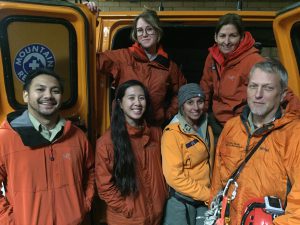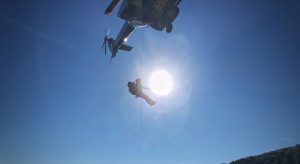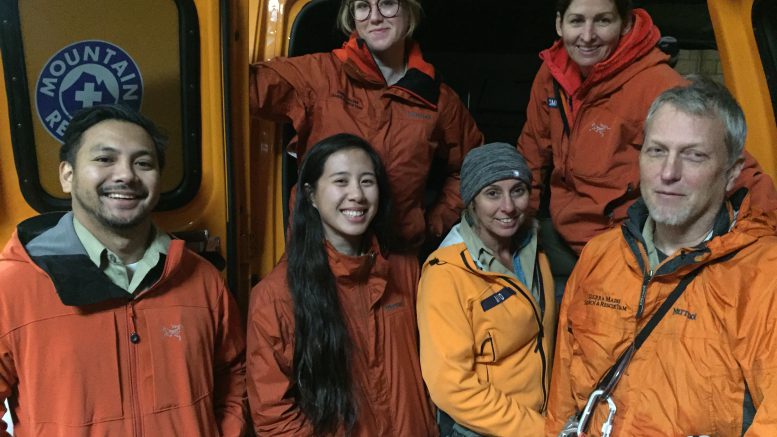 Press Release posted 2/14/19 – Sierra Madre Search & Rescue’s (SMSR) newest team members have begun to serve the team and respond to calls for help in the wilderness, but they still face a long and challenging training period.
Press Release posted 2/14/19 – Sierra Madre Search & Rescue’s (SMSR) newest team members have begun to serve the team and respond to calls for help in the wilderness, but they still face a long and challenging training period.
As new recruits, these four women and two men are designated as probationary team members until they complete the training process. Their first six months of training have covered knot tying, helitac training, patient packaging, ascending a rope and a physical fitness test. One trainee reports, “The last six months have been about learning strengths and weaknesses I never knew I had, and facing challenges head on and working through the pain and frustration to conquer them.” The team is proud of their work, and looks forward to seeing them become full members.
Like all team members, probationary members are all volunteers. As they balance day jobs as sales managers and storyboard artists, the time commitment to the team is daunting. One full team member stated, “I knew going in that the time commitment was most probationary member’s Achilles’ heel, but as much as the current team members tried to convey this, it could not be fathomed without experiencing it first hand.”
Each member of the current training class will put in an average of 700 hours with the team in the next year. They attend probationary member training Monday nights, monthly team training, business meetings and search and rescue operations. Many more hours are spent practicing on their own and with their classmates.
In the remaining nine months of their training they will learn to operate GPS units, face a field navigation test, build and operate rope systems, complete a five day backpacking course and much more. When their training is completed and they have passed written and practical exams they will become full team members and wear the Mountain Rescue Association’s “blue patch” on their uniform.
Even then training is not over. Once they are full members they will study to certify as Emergency Medical Technicians. Full team members continuously study to improve their search and rescue skills by learning new mapping technologies, search management, and operational leadership. This leadership training is often provided in house by the senior operations leaders, and is supplemented by attending national conferences such as the International Technical Rescue Symposium, and the annual Mountain Rescue Association Summer Conference.
 When asked about their training year, whether you speak to those who completed it 10 years ago or 10 months ago, team members often talk about the friendships made. One member stated, “During training you become a close knit team whose bonds are probably tighter than many friendships you’ve had in your life.“ Sierra Madre Search and Rescue exists to respond when others are in need of help in the wilderness, but to meet the demands that are placed on an individual to execute that goal they rely on each other. As one team member explained, ”Before joining SMSR, I could count the number of lifelong friends I had on a single hand; but now…the bonds I have established with my fellow teammates and especially with my classmates are like none other I’ve experienced before.“
When asked about their training year, whether you speak to those who completed it 10 years ago or 10 months ago, team members often talk about the friendships made. One member stated, “During training you become a close knit team whose bonds are probably tighter than many friendships you’ve had in your life.“ Sierra Madre Search and Rescue exists to respond when others are in need of help in the wilderness, but to meet the demands that are placed on an individual to execute that goal they rely on each other. As one team member explained, ”Before joining SMSR, I could count the number of lifelong friends I had on a single hand; but now…the bonds I have established with my fellow teammates and especially with my classmates are like none other I’ve experienced before.“
If you would like to join the next recruiting class of SMSR visit their website at www.smsr.org. The team is made of volunteers like you who serve their motto, “Anywhere in the wilderness that someone needs help. . .” The requirements to join are that you be at least 25 years old, live within 20 minutes of Sierra Madre and are comfortable in the wilderness. They will teach you the rest if you are willing and able.
For more than 60 years the all-volunteer Sierra Madre Search and Rescue team has been responding to calls for help in the local mountains and beyond. Funded entirely by private donations, SMSR provides a range of public programs on wilderness safety in addition to its search and rescue activities. The Team never charges for any of its services.
For more information, including how to arrange a wilderness safety demonstration for your school or group, visit www.smsr.org.

